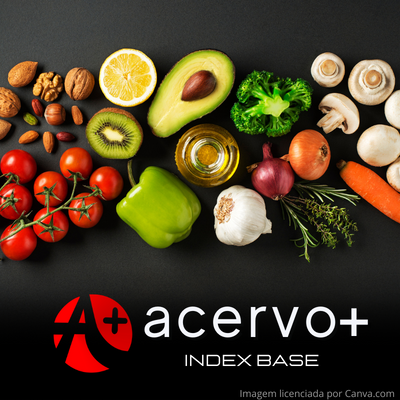Evidências científicas dos impactos de compostos bioativos no indivíduo adulto diabético: uma revisão integrativa
##plugins.themes.bootstrap3.article.main##
Resumo
Objetivo: Identificar evidências presentes na literatura científica, no quinquênio compreendido entre janeiro de 2017 e dezembro de 2021, acerca dos impactos dos compostos bioativos sobre os parâmetros no Diabetes Mellitus (DM). Métodos: Consistiu em uma revisão integrativa com estudos publicados nas bases de dados SciELO, MEDLINE e LILACS. Os critérios de inclusão de estudos foram artigos de revistas científicas; pesquisas realizadas em humanos; qualis B2 ou superior; estudo com compostos bioativos voltados a parâmetros do DM. Resultados: Foram incluídos quatro estudos clínicos randomizados que abordavam os parâmetros do DM: glicemia de jejum; teste oral de tolerância à glicose; hemoglobina glicada; marcador de resistência e sensibilidade à insulina, estimativa das atividades da célula β pancreática e de insulina sérica. Os resultados evidenciados no estudo mostraram que alguns parâmetros não obtiveram alteração, porém notou-se evidentemente que o impacto do consumo dos compostos bioativos principalmente do grupo dos polifenóis, os glucosinolatos e os poliacetilenos foram significativos em sua maioria. Considerações finais: Nessa revisão evidenciou-se o impacto positivo no consumo ou suplementação de alimentos com compostos bioativos nos parâmetros do DM, considerando o uso de hipoglicemiantes e com ou sem envolvimento de atividade física.
##plugins.themes.bootstrap3.article.details##
Copyright © | Todos os direitos reservados.
A revista detém os direitos autorais exclusivos de publicação deste artigo nos termos da lei 9610/98.
Reprodução parcial
É livre o uso de partes do texto, figuras e questionário do artigo, sendo obrigatória a citação dos autores e revista.
Reprodução total
É expressamente proibida, devendo ser autorizada pela revista.
Referências
2. BOEING H, et al. Critical review: Vegetables and fruit in the prevention of chronic diseases. European Journal of Nutrition, 2012; 51(6): 637-663.
3. BOTELHO LLR, et al. O método da revisão integrativa nos estudos organizacionais. Gestão e Sociedade, 2011; 5(11): 121–136.
4. CHANDRA K, et al. Effect of Cichorium intybus seeds supplementation on the markers of glycemic control, oxidative stress, inflammation, and lipid profile in type 2 diabetes mellitus: A randomized, double-blind placebo study. Phytother Res, 2020; 34(7); 1609-1618.
5. DA PORTO A, et al. Polyphenols rich diets and risk of type 2 diabetes. Nutrients MDPI AG, 2021; 13 (5), 1445.
6. DESAI T, et al. Effects of short-term continuous Montmorency tart cherry juice supplementation in participants with metabolic syndrome. European Journal Of Nutrition, 2020; 60(3): 1587-1603.
7. FALLAH A, et al. Effect of dietary anthocyanins on biomarkers of glycemic control and glucose metabolism: A systematic review and meta-analysis of randomized clinical trials. Food Research International Elsevier Ltd, 2020; 137: 109379.
8. FLOR LS, CAMPOS MR. Prevalência de diabetes mellitus e fatores associados na população adulta brasileira: Evidências de um inquérito de base populacional. Revista Brasileira de Epidemiologia, 2017; 20(1): 16–29.
9. GOMES BF, ACCARDO CM. Immunoinflammatory mediators in the pathogenesis of diabetes mellitus. Einstein, 2019; 17(1): 4596.
10. MUHAMMAD I, et al. Antidiabetic activities of alkaloids isolated from medicinal plants. Brazilian Journal of Pharmaceutical Sciences, 2021; 57.
11. NGUELEFACK TB, et al. Multimodal α-Glucosidase and α-Amylase Inhibition and Antioxidant Effect of the Aqueous and Methanol Extracts from the Trunk Bark of Ceiba pentandra. BioMed Research International, 2020; 1-13.
12. OJO O, et al. The effect of dietary glycaemic index on glycaemia in patients with type 2 diabetes: A systematic review and meta-analysis of randomized controlled trials. Nutrients MDPI, 2018; 10(3): 373.
13. POUR ED, et al. Forecast of ameliorating effect of dietary flavonol consumption in white tea with or without aerobic training on type 2 diabetes (T2D) in females. Clinical Nutrition Espen, 2021; 134-140.
14. RACHDAOUI N. Insulin: The friend and the foe in the development of type 2 diabetes mellitus. International Journal of Molecular Sciences MDPI, 2020; 21(5): 1770.
15. RATHWA N, et al. β-cell replenishment: Possible curative approaches for diabetes mellitus. Nutrition Metabolism and Cardiovascular Diseases. Elsevier B.V; 2020; 30(11): 1870-1881.
16. SCHWINGSHACKL L, et al. Food groups and risk of type 2 diabetes mellitus: a systematic review and meta-analysis of prospective studies. European Journal of Epidemiology, 2017; 32(5): 363–375.
17. SUN H, et al. IDF Diabetes Atlas: Global, regional and country-level diabetes prevalence estimates for 2021 and projections for 2045. Diabetes Research and Clinical Practice, 2022; 183: 109119.
18. THORUP AC, et al. Strong and Bitter Vegetables from Traditional Cultivars and Cropping Methods Improve the Health Status of Type 2 Diabetics: a randomized control trial. Nutrients, 2021; 13(6): 1813.
19. VINAYAGAM R, et al. An insight into anti-diabetic properties of dietary phytochemicals. Phytochemistry Reviews, 2017; 16(3): 535-553.
20. VITALE M, et al. Impact of a mediterranean dietary pattern and its components on cardiovascular risk factors, glucose control, and body weight in people with type 2 diabetes: A real-life study. Nutrients, 2018; 10(8): 10.
21. ZHANG P, et al. Oxidative stress and diabetes: antioxidative strategies. Frontiers of MedicineHigher Education Press Limited Company, 2020; 14(5): 583-600.
22. ZHAO C, et al. Regulation of glucose metabolism by bioactive phytochemicals for the management of type 2 diabetes mellitus. Critical Reviews in Food Science and Nutrition Taylor and Francis Inc, 2019; 59(6): 830-847.

